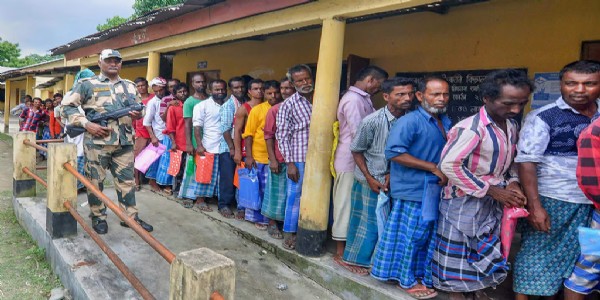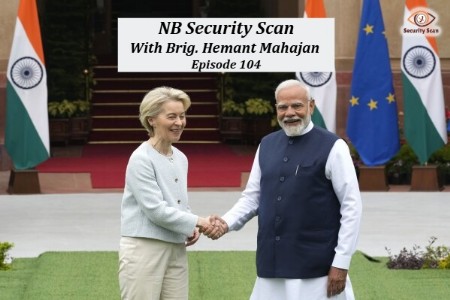#SecurityScan 38: India's fight against China’s Global Media
Leading a high-ranking delegation to New Delhi at the invitation of National Security Advisor (NSA) Ajit Doval, Vietnam"s Minister of Public Security General To Lam spent two days in the Indian capital at the start of this week.
Total Views | 450
This article is a summary of important events that have taken place in last one week affecting, India's national security.
COUNTERING CHINESE MULTI DOMAIN WAR
How to Fight Back Against China’s Global Media and Information Offensive
Beijing has acquired control of both the traditional media sector and innovative communication technologies.
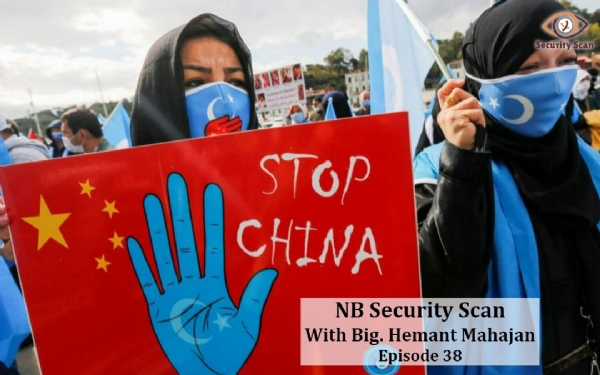
These include Beijing’s global expansion of its state media outlets like Xinhua, its network China Global Television Network (CGTN), as well as its increasing control of all Chinese-language media around the world, including in virtually every European country where there are Chinese-language media outlets.
In addition to the traditional media sector, Beijing has built information “pipes” like 5G networks and undersea cables in the information space. It has also expanded its more sophisticated use of disinformation on social media platforms and relies on increasingly popular social media platforms like TikTok, WeChat, and other tools.
Policymakers in many regions in Europe—are beginning to recognize the threat of Beijing’s expanding media, information, and traditional influence actions. But more coordination and decisive action are needed.
Shipping Lines Are Getting Worried About Over Dependence on China
In February, shipping giant Maersk took possession of a new cargo vessel, one that can meet the International Maritime Organization’s requirements for zero-emission shipping. That’s the good news. The bad news? The Maersk Biscayne was built by the Jiangsu New Yangzi shipyard in China, where Maersk has several more ships waiting to be built. Shipping companies are discovering that they’re far too dependent on Chinese shipyards, at a time when the rapid downward spiral of China’s relationship with the West could have calamitous effects.
Western countries’ building shipyards will take a lot of time, and a lot of money, to restore to anything close to what’s needed. For long time most countries in the world would be dependent for the shipping requirement on China which, is very dangerous proposition.
China is its own worst enemy
Xi’s belligerence prompts classic balancing, an alignment among smaller states that would alone struggle to compete. Beijing’s behaviour, particularly its economic coercion against crucial Australian industries such as wine, barley and coal, has merely reinforced the idea throughout Australia’s politics that Beijing is no longer a reliable partner. Same is a case in South East Asia.
China's Overseas Ports Acquisition Program
China is a powerhouse in global trade. Its rapid growth has been significantly fuelled by decades of rising exports, bringing new emphasis to the role ports play in trade and strategic relations.
Overseas port investments and potentially military base access, particularly in countries of global and geostrategic importance near maritime chokepoints, could give China greater influence over key supply chain networks.
Don’t Look Away from China’s Atrocities Against the Uyghurs
Ramzan fast has been banned for Chinese Uygur Muslims While atrocity crimes — and the pursuit for accountability — in Ukraine have dominated global attention in the last year, momentum has continued to build in seeking accountability for China’s crimes against the Uyghurs and other minority groups. Most of this progress has been made at the state level, including legal cases under the principle of universal jurisdiction, atrocity determinations finding that genocide and crimes against humanity are ongoing, and efforts to exclude Chinese goods made with forced labor from domestic markets. Although this momentum has been slow and not without setbacks, it has also been steady, strengthening the record of Beijing’s crimes against the Uyghurs and the overall case for accountability.
Promoting the RMB Will Limit, but not Quash, China’s Vulnerability to US Currency Sanctions
China, the world’s second largest economy, and Saudi Arabia, the world’s pivotal oil producer, have been in talks to promote greater use of the RMB in oil deals, while China and Brazil recently agreed to transact bilateral trade in their own currencies, sidestepping the dollar.
The push for greater use of the renminbi in its foreign trade reflects Beijing’s desire to limit its geo-economic vulnerability vis-à-vis Washington, particularly for critical imports, such as oil.
Is China in Myanmar building a spy base on Great Coco Island? New satellite imagery shows construction on an archipelago close Indian outpost
The islands are experiencing a steady makeover, with tell-tale signs of military modernization and facilities to support aircraft. Instead of the phantom Chinese intelligence post still prevalent in the popular imagination, the latest images reveal that Myanmar may soon be intending to conduct maritime surveillance operations from Great Coco Island, the largest in an isolated archipelago that lies just 55 kilometres north of India’s strategic Andaman and Nicobar Islands.
Great Coco is thus potentially a point of future leverage. Were Myanmar to get the base fully established, surveillance flights could track movements to and from the Andaman and Nicobar Islands. Given China’s well-established intelligence practices, local intelligence from Great Coco could find its way, either through espionage or consent, to Shanghai.
For India, Great Coco Island was in the past a place for outlandish theories. It may now become a real point of concern.
China sends carrier group off Taiwan coast ahead of US meeting
Taiwan's defence ministry has confirmed that a Chinese aircraft carrier group is in the waters off the island's southeast coast, amid concerns that China may react if President Tsai Ing-wen meets with US House Speaker Kevin McCarthy. China regards Taiwan as its territory and has warned of unspecified retaliation if the meeting goes ahead.
The Taiwan Strait, just 130 kilometres (80 miles) wide at its narrowest point, is a major international shipping channel and all that lies between democratic, self-ruled Taiwan and its authoritarian neighbour.
Taiwan detects Chinese warships, planes around island after drills end
China launched three days of military exercises around self-ruled Taiwan on Saturday that saw it simulate targeted strikes and practise a blockade of the island. The show of force from Beijing, which claims the island as part of its territory, was a response to Taiwan President Tsai Ing-wen's meeting with US House Speaker Kevin McCarthy last week, an encounter it had warned would provoke retaliatory measures.
Taiwan president thanks fighter pilots as Chinese drills ebb
In the central Taiwanese city of Taichung, Tsai met fighter pilots in who are often stationed at the front-line air base of Magong in the Taiwan Strait, thanking them for their hard work and for sticking to their posts around the clock. "I want to tell everyone: as long as we are united, we can reassure the country's people and let the world see our determination to protect the nation," she said in a video clip provided by the presidential office.
What the Quad could learn from AUKUS
If the four QUAD powers decide to adopt a greater security role, they should go beyond empty signals.
In the absence of material effects, “cheap talk” may even send an opposite message. Signals without action lack credibility.
Quad members could also shift the material balance quickly by repositioning existing military forces. Quad members have valuable real estate that, with new access and basing arrangements, could significantly disrupt Chinese military planning. Australia’s Cocos Island, and India’s Andaman and Nicobar Islands, for example, both lie close to key chokepoints and China’s military facilities in the South China Sea.
China Left Out of Sri Lanka Debt Talks Amid Angst Over Delays
Sri Lanka and major creditors formally launched talks to restructure the nation’s debt without China — its biggest bilateral lender — a signal of growing frustration with Beijing’s approach to debt woes in the developing world.
Finance chiefs from India, Japan and the Paris Club of sovereign creditors held a joint briefing Thursday evening in Washington with the International Monetary Fund to mark the start of the restructuring.
Wary of China, Vietnam bonds with India in Indo-Pacific waters
eijing, Vietnam, National Se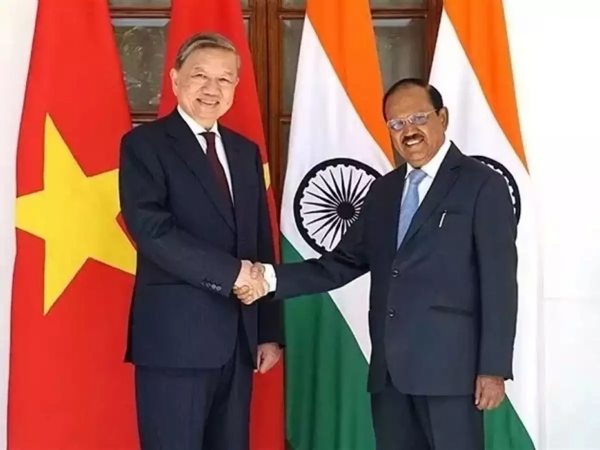

Leading a high-ranking delegation to New Delhi at the invitation of National Security Advisor (NSA) Ajit Doval, Vietnam's Minister of Public Security General To Lam spent two days in the Indian capital at the start of this week, jointly mapping out the future defence and security cooperation between the two countries.
Pakistan warns of cross border strikes on terrorist hideouts in Afghanistan
Pakistan’s defence minister, Khawaja Asif, said Islamabad has warned the Afghan Taliban it will strike terrorist hideouts inside Afghanistan if Kabul is unable to rein in anti Pakistan militants. Khawaja Asif said that during his visit to Kabul in mid-February, he reminded the Taliban leaders to live up to their cross-border security commitments forbidding terrorists from using their soil for attacks on Pakistan and, that, Islamabad would take action otherwise. “If that is not done, at some point we’ll have to ... resort to some measures, which will definitely — wherever (terrorists) are, their sanctuaries on Afghan soil — we’ll have to hit them,” he said, adding, “We’ll have to hit them because we cannot tolerate this situation for long.”
Since the Taliban takeover of Afghanistan in August 2021, Pakistan has seen a resurgence in terror attacks planned and conducted by Tehreek-e-Taliban Pakistan (TTP), having deep roots with the Afghan Taliban, alQaida, and the Islamic State-Khorasan (IS-K).
The country recorded at least 262 terror attacks in 2022, of which the TTP was responsible for at least 89. Last November, the group ended a unilateral ceasefire after talks with Islamabad broke down. Since then, Pakistan has seen near-daily attacks, most of them targeting military and police personnel.
The minister also criticized former Pakistan prime minister, Imran Khan, and the previous military and intelligence leadership, for allowing thousands of Taliban fighters and their families to return to Pakistan in a bid to continue negotiations with the militants. Intelligence reports said the decision allowed the terrorists to regroup. Pakistani government and security officers allege the TTP fighters attacking Pakistan are using arms and equipment left behind by the US troops at the end of the 20-year war in Afghanistan.
TTP is using light weapons, assault rifles, ammunition, night vision goggles, and sniper rifles that the US troops had left behind.
Pakistan Army Chief Asim Munir focused on unifying army and keep Imran Khan out of polls
Pakistan Tehreek-e-Insaf (PTI) chairman Imran Khan has been able to survive thus far in Pakistan's politics due to his tenacity and continued support from elements within the Pakistan army.
Opening of Maoist Insurgency Period Cases and its Impact on Prime Minister’s Future in Nepal
It is yet to be seen what course Nepalese politics wouldtake after the Supreme Court’s verdict on the petitions of the victims against Prime Minister Dahal. If he gets a clean chit in the court in the case of the atrocities during the Maoist insurgency period, it will strengthen his position both within the Maoist party and at the national level. But if he loses the case, it will add to his miseries and create turmoil in national politics
EXTERNAL SECURITY
Four soldiers killed in 'firing incident' at Bathinda military station
The four personnel, who were in their mid 20s, were sleeping when the firing took place around 4:30 am in a barrack.
Group Commander's dismissal sought over downing of Mi17 after Balakot
A senior Air Force officer being tried for his role in an incident of 'friendly fire' resulting in the shooting down of a Mi 17 chopper at Budgam on February 27, 2019, a day after the Balakot air strikes, has been recommended for dismissal by a General Court Martial .
War in space a possibility, need to develop dual-use platforms in that domain: CDS Gen Chauhan
The CDS flagged the anti-satellite tests carried out by Russia and China and stressed on the need for India to build offensive and defensive capabilities in the space domain. "As far as India is concerned, the present and future challenges are that India should transit from space support to a space enhancement in the space domain. The aim for all of us should be towards developing dual-use platforms with a special focus towards incorporating cutting-edge technology," Gen Chauhan said
No one can encroach even an inch of our land: Amit Shah in Arunachal Pradesh
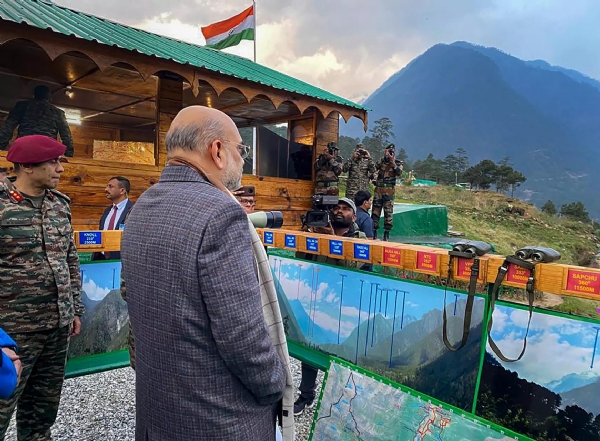
India's Home Minister Amit Shah said that the era when anyone could encroach on India's land has passed, and credited the valour of army personnel for ensuring that no one can encroach even an inch of India's land. Speaking at Kibithoo in Arunachal Pradesh, Shah launched the Vibrant Villages programme and emphasised that border areas are the top priority of the Modi Government, pointing to the infrastructure and other development works carried out in the Northeast.
ITBP officer killed in accident during LAC patrol in Ladakh
A 33-year-old Indo-Tibetan Border Police (ITBP) officer, who was leading a patrol along the India-China LAC in Ladakh, was killed after falling into a deep gorge, officials said. Assistant Commandant Tikam Singh Negi was killed in the line of duty in the Ladakh sector of the Line of Actual Control (LAC) on April 2.
Army, cops in J&K reach out to Chenab valley youths to scuttle cross-border terrorist recruitment bid
Army and police in Jammu & Kashmir's Chenab valley have launched a massive youth outreach programme amid attempts by Pakistan-based terror commanders to recruit new militants to revive their operations. The Chenab valley district, comprising of Doda, Kishtwar and Ramban, has seen a recent increase in cross-border calls with nearly 80 youths placed under police surveillance, according to officials.
SLINEX 2023: India, Sri Lanka gears up for Sea Phase
The Indian and Sri Lankan navies have concluded their Pre Sail Conference in readiness for the upcoming SLINEX-2023, a bilateral naval exercise aimed at strengthening ties and enhancing mutual understanding. Held in Sri Lanka, the Harbour Phase was organised in the capital of Colombo from 3 to 5 April with the Sea Phase due to commence from 6 April and run until 8 April.
MAKE IN INDIA
India-designed chip to track school buses, weapons systems
The 12-nanometre chip can be fitted into a mobile phone or any handheld device and receive signals from the Navigation with Indian Constellation (NavIC) or the Indian Regional Navigation Satellite System (IRNSS), the Global Positioning System of the US and the GLONASS constellation of Russia.
IIT-Kanpur partners with defence PSU to focus on innovation
IIT Kanpur's technology business incubator, the Startup Incubation and Innovation Centre (SIIC), has signed a CSR Agreement with Advanced Weapons and Equipment India Limited, one of the seven new Defence Public Sector Undertakings (PSUs) formed by converting the Ordnance Factory Board into fully government-owned enterprises.
ENERGY SECURITY
India’s Moment in the Geopolitics of Oil Ensuring Oil Security
Global energy markets have battled continuous uncertainty over the past three years, disrupted first by the Covid-19 pandemic in 2020 and 2021, and by Russia’s invasion of Ukraine in 2022. India has been adept at navigating both these disruptions, using economic diplomacy to position itself favourably in the geopolitics of oil.
New Delhi’s delicate balancing of its political relationship with both Washington DC and Moscow has been accompanied by oil diplomacy; indeed, Russia and the US are amongst India’s top five sources of oil imports. As India reduces its dependence on fossil fuels and expands its energy matrix to include more renewables, New Delhi must continue to take advantage of the evolving geopolitics of oil.
LESSONS FROM UKRAINE WAR
How Putin saved NATO
Thus, the ‘brain dead’ alliance has bounced back—nothing like an impending hanging to concentrate the mind. NATO, give or take Hungary or Turkey, has grasped the obvious. The war on its doorsteps is not just about Ukraine, but also about a precious European order that has delegitimised conquest. The stakes could not be higher. As in Stalin’s days, Putin’s lunge has reintroduced the spectre of Russian hegemony over Europe. Putin wants a certified sphere of influence, preferably a back-to-the-future restoration of the old Soviet empire.
Already, Russia’s war of aggression has revealed the price of three decades of European disarmament. The alliance has shrunk not only its munitions stockpiles, but also its arms production lines. High-intensity protracted warfare seemed to have gone the way of the buggy. Yet, whichever way the war goes, it holds a sobering lesson for the West: pile up plenty of gear and ordnance, invest in mobility and train your troops.
‘A conqueror is always a lover of peace,’ taught Clausewitz. They want to move in ‘quite calmly’. Hence, ‘we must prepare for war’ in order to avert it. As the West peers ahead, it should heed the age-old rule: deterrence is better than having to halt aggression. It is also a lot cheaper.
Pakistan to ship 230 containers of arms to Ukraine
Signallng to deepen defence partnership, Pakistan will ship 230 defence containers this month from the Karachi Port via two vessels MV Bokram and MV Kherson.
--
Bharati Web





